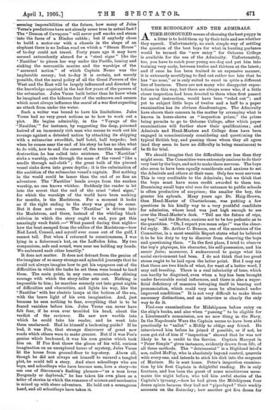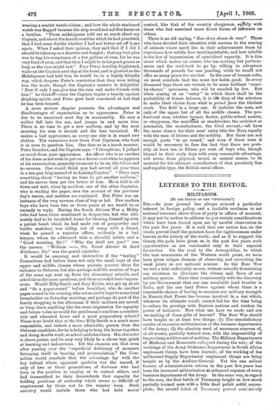A TIME-HONOIIRED means of choosing the best puppy in a litter
is to hold them up by their tails and see whether they squeak. Unfortunately, no such simple way of settling the question of the best boys for what in hunting parlance would be termed the "new entry" for Osborne College is available for the use of the Admiralty. Unfortunately, too, you have to catch your young sea-dog and put him into training very early, between twelve and thirteen at the latest; and if once he has been trained in an expensive manner, it is extremely mortifying to find out rather too late that he has "no nose," or is only suited to excel in quite a different line of business. There are not many who disappoint expec- tations in this way, but there are always some who, if a little closer inspection had been devoted to them when first passed for naval instruction, would have been "ruled out "; and yet to subject little boys of twelve and a half to a paper examination has its obvious disadvantages. The Admiralty have shown their concern in the matter by arranging what is known in horse-shows as "inspection prizes," the prizes being permits to go to Osborne College, after which paper examinations will further show their qualifications ; and Admirals and Head-Masters and College dons have been engaged in conscientiously considering and questianing the typical British boy, and passing those whom they all agree (and they seem to have no difficulty in being unanimous) to be fit for trial.
We should imagine that the difficulties are less than they might seem. The Committee were extremely anxious to do their very best by the boys, and not to make them nervous. The boys also seem to have been equally considerate and anxious to set the Admirals and others at their ease. Only two were nervous. This is very creditable to the Admirals ; but we think that the boys must have some credit awarded to them too. Examining small boys viva roes for entrance to public schools is often productive of surprises ; the smaller the boy, the greater his aplomb. Many years ago Dr. Haig-Brown, then Head-Master of Charterhouse, was putting a few questions in his kindly way to a very youthful candidate for admission, whose head was just high enough to see over the Head-Master's desk. "Tell me the future of rep, my boy," said the Doctor, anxious not to be too pedantic as to the quantities. "Oh, I expect you mean lap!" was the cheer- ful reply. Mr. Arthur C. Benson, one of the members of the Committee, in a most sensible Report states what he believed it to be his duty to try to discover from observing the boys and questioning them. "In the first place, I tried to observe the boy's physique, his character, his self-possession, and his savoir faire; moreover, I endeavoured to gauge what his social environment had been. I do not think that too great stress ought to be laid upon the latter point. But I may say that there are two kinds of what, for want of a better word, I may call breeding. There is a real inferiority of tone, which can hardly be disguised, even when a boy has been brought under favourable social influences, and there is also a super- ficial deficiency of manners betraying itself in bearing and pronunciation, which could very soon be eliminated under improved conditions." It is not very difficult to make these necessary distinctions, and an interview is clearly the only way to do it.
Viva-roes examinations for Midshipmen before entry on the ship's books, and also when "passing" to be eligible for a Lieutenant's commission, are no new thing in the Navy. In the Napoleonic Wars the Captain seems to have been able practically to "enlist" a Middy to oblige any friend. He interviewed him before he joined if possible, or if not, he soon got rid of him if " inspection " showed that lie was not likely to be a credit to the Service. Captain Marryat in "Peter Simple" gives instances, evidently drawn from life, of all these methods. The " detrimental " is a Highland laird's son, called McFoy, who is absolutely beyond control, quarrels with every one, and intends to stick his dirk into the sergeant of Marines. He is sent home. Peter's inspection examina- tion by his first Captain is delightful reading. He is only fourteen, and has been the guest of some mischievous mess- mates the night before, who tell him awful stories of the Captain's tyranny,—how he had given the Midshipmen four dozen apiece because they had not "pipeclayed " their weekly accounts on the Saturday; how another got five dozen for wearing a scarlet watch-ribbon ; and how the whole starboard watch was flogged because the ship would not sail five knots on . a bowline. "These midshipmen told me so much about my Captain, and about the horrid cruelties which he had practised, that I had some doubts whether I had not better set off home again. When I asked their opinion, they said that if I did I should be taken up as a deserter and hanged ; that my best plan was to beg his acceptance of a few gallons of rum, for he was very fond of grog, and that then I might be in his good graces as long as the rum might last." Poor Peter, horribly frightened, waits on the Captain next day at his hotel, and is greeted as the Midshipman had told him he would be, in a highly friendly way, which deepens Peter's conviction that they were telling
him the truth, though the Captain's manner is delightful. "Now if only I can give him the rum and make friends with him!" he thinksi—when the Captain begins a homily against drinking spirits, and Peter goes back convinced at last that he has been hoaxed.
A more serious chapter presents the advantages and disadvantages of examination as to appearance. Peter is due to be examined next day in seamanship. He sees a soldier fall into the sea, and jumps in and saves him. There is no time to get a new uniform, and by the next morning his own is shrunk and the lace tarnished. He makes a bad appearance, as every one else is in smart new clothes. The examiners were three Post Captains, who took it in turn to question him. One does so in a harsh manner, Peter blunders, and the Captain says: "I thought so; I judged as much from your appearance. An officer who is so careless of his dress as not even to put on a decent coat when he appears at his examination, generally turns out to be an idle fellow and no seaman. One would think you had served all your time in a ten-gun brig instead of in dashing frigates." "Peter says something about "having no time to get another uniform," and his nerves then get the better of him. He is told to sit down and wait, when by accident one of the other Captains, who is reading the paper, sees the account of the previous day's rescue, and matters are explained. But Peter was an instance of the very nervous class of boy or lad. Few modern boys who have been two or three years at sea would be so unready in reply. During the South African War a Middy (who had been twice mentioned in despatches, but who ulti- mately had to be invalided home for blowing himself up with a patent bomb which he had made out of gunpowder and lucifer matches) was riding out of camp with a friend, when he passed a superior officer, evidently in a bad temper, whom he addressed with a cheerful salute, and a "Good morning, Sir !" "Who the devil are you?" was the answer. "William —, Sir, Naval Adviser to Lord Kitchener, Sir," was the genial rejoinder.
It would be amusing and instructive if the " tasting " Committees had before them not only the small boys of the upper and middle classes whose parents present them for entrance to Osborne, but also perhaps half the number of boys of the same age sent up from the elementary schools, and asked them the same questions, and then recorded their impres- sions. Would Billy Smith and Joey Eccles, who get up at six and "do a paper-round" before breakfast, who do another paper-round in the evening, who act as useful boys to some local householder on Saturday morning, and perhaps do part of the family shopping in the afternoon if their mothers are unwell or busy, leave anything like the same impression for capacity and future value as would the gentleman's son from a comfort- able and educated home and a good preparatory school ? There is no doubt that at the time Billy Smith is a much more responsible, and indeed a more admirable, person than the Osborne candidate, for he is helping to keep the home together and doing double work, at school and elsewhere. His character is above praise, and he may very likely be a clever boy, quick at learning and industrious. Yet the chances are that even after passing over the "superficial deficiency of manners betraying itself in bearing and pronunciation," the Com- mittee would conclude that the advantage lay with the boy behind whose apparent qualities was the record, if only of two or three generations, of forbears who had been in the position to employ or to control others, and had transmitted to their descendants that capacity for holding positions of authority which seems so difficult of acquirement by those not to the manner born. Such ancestry would include those who had held moral There is an old saying, "Bon chien chasse de race." Those who have devoted their attention with success to the rearing of animals whose merit lies in their achievements learn by experience how subtle, how inextinguishable, and how reliable is the law of transmission of specialised capacity. It is this alone which makes an owner, who has nothing but perform- ances and the stud-book to go by, willing to adventure thousands of pounds for one yearling, while he would net offer as many pence for another. In the case of human colts, we must conclude that the same law holds good. In every thousand boys there are certain to be some brilliant " come- by-chance " specimens, who will be excelled by few. But when aiming at an " entry " in which there shall be the probability of fewest failures, it is tat duty of the selectors to make their choice from what is prime& facie the likeliest stock. The field is a large one. It includes the sons, not only of the upper, but of all the middle classes. The pro- fessional man, whether lawyer, doctor, public-school master, or clergyman, the mercrint or stockbroker, the architect or journalist, the manufacturer, the Civil servant,—all have the same chance for their sons' entry into the Navy equally with the man of leisure and the nobility. But there are not enough posts "to , go round," and even if there were it would be necessary to face the fact that there are prob- ably at least ten or fifteen per cent. of boys who, though blessed in their early days with every reasonable advantage, will never, from physical, moral, or mental causes, be fit material for the ultimate manufacture of that peculiarly line an capable type, the British naval officer. •







































 Previous page
Previous page